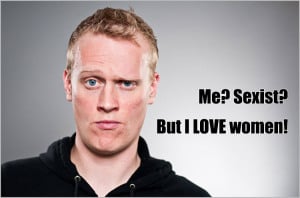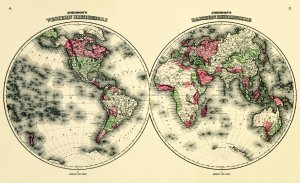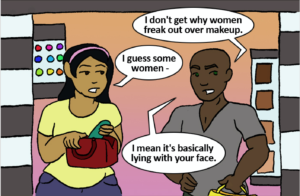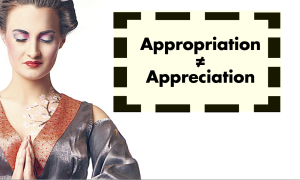
A nurse sitting in a doctor’s office with a patient.
This article was originally published on Beauty School and republished here with the author’s permission.
Here’s a social experiment: Tweet that science is subjective – that there’s no such thing as objective truth – and watch what happens.
Actually, don’t do that. Let me save you the agony: What happens is a flood of anger usually reserved for the Old Testament. People flip out.
In a socio-historical moment where scientism prevails over all other schools of thought (um, although that seems to be changing with this new administration), we struggle to come to terms with the idea that not everything is easily observable through the scientific method, that biases seep into research, that “fact” is partially socially constructed.
So when you suggest that maybe the truth isn’t out there, after all (because what is truth anyway?), you’re met with a heavy dose of resistance – often expressed with the C-word for some reason.
Now let’s add a layer of complication to this. Let’s add, beyond this trust that people hold for science, the value that people hold for health.
Express, implicitly or explicitly, that there is a subjective, biased, socially constructed side to how we conceptualize health, and people will honestly believe that you are a conspiracy theorist.
Of course, you’re not. Understanding that health is more complicated than the institution of Western Medicine wants you to believe doesn’t make you a conspiracy theorist; it makes you a critical thinker.
But it’s really hard to break into a justice-oriented understanding of health when we’ve been set up to believe that a) anatomy, physiology, and biology are unquestionable sciences and b) the pursuit of an ideal of health is of utmost importance because, like, death kinda sucks. Propagation of the species and all that.
But here’s the thing: The concept of health has always been complicated. It shifts and evolves, depending on space and time. It’s never been static. It’s fluid.
And exploring the sociohistorical development of health as an idea isn’t to suggest questioning whether or not it’s a thing. We’ve all had the flu before and wondered why we weren’t grateful for our previous ability to breathe. Rather, looking at health as (at least partially) socially constructed investigates how we understand it as a thing.
And our understanding of health is subjective as all hell. Here are five social theories that support that:
1. Healthism
Healthism (Crawford, 1980) describes a political ideology wherein a biomedical understanding of health is given social power and individuals are held responsible for their ability to uphold their own health.
That is, it’s our cultural belief that meeting the standards of a one-size-fits-all version of health should be a priority for everyone – and that those who don’t meet that criteria can and should be oppressed as punishment.
It is, basically, the idea that health is valuable – not just individually, but socially.
And it’s deeply embedded in our cultural consciousness. Think about it: How often have you heard someone say, in regards to a pregnancy or birth, “As long as the baby is healthy?”
I get it. It makes sense that we would be evolutionarily drawn to the idea of good health and longevity. But prioritizing health (and especially making it a moral issue) still creates a hierarchy wherein some people are deemed more worthy than others – and that’s an oppressive way to think about our bodies.
Health, sure enough, is arguably a physical experience of biological beings. But our moral obligation to health is something that we, ourselves, created.
Want to learn more? Read Against Health: How Health Became the New Morality, edited by Jonathan M. Metzl and Anna Kirkland.
2. Social Model of Disability
And the social model of disability (Oliver, 1983) is a great example of what it looks like to push against healthism.
The medical model of disability – which is the status quo understanding of disability – is rooted in healthism. It supposes that the physical conditions inherent in an individual’s body are why people are disadvantaged: “You will face X obstacles in life because you have y condition.”
It suggests that there’s one way of being healthy, and if you don’t meet the ideal, that’s your problem.
The social model of disability, on the other hand, says, “No. Screw that. Society is organized in such a way that barriers and restrictions exist for disabled people. That’s not on individuals — that’s on society.”
It suggests that it’s society’s responsibility not to be disabling, not individuals’ responsibility not to be disabled.
The social model of disability calls out healthism’s BS bootstraps myth. It names that society created body-based oppression and that only society – not individual oppressed people – is responsible for changing that.
Want to learn more? One of my favorite academic articles I’ve ever read is “A Reluctance to Be Defined ‘Disabled’: How Can the Social Model of Disability Enhance Understanding of Anorexia?” by Stephanie Tierney.
3. Biopsychosocial Model
The biopsychosocial model (Engel, 1977) was created in response to the biomedical lens – the latter of which assumes that all disease and disorder has an organic cause, and therefore, an organic solution, within the body. Using a biopsychosocial lens means recognizing that biology, psychology, and sociocultural factors all play a role in how we develop and are treated for illness.
It’s a way more holistic (and honest) way of looking at health.
Western Medicine hyper-medicalizes health – which seems sensible at first. But only because we’ve been socialized to believe that our bodies should operate like machinery and that with a little fine-tuning from doctors, we can live long and healthy lives.
But no. Our health isn’t only determined by what’s going on in our physical bodies (more on that next), so we need to think more broadly about it. Not because medicine isn’t legitimate – but because it’s limited.
All three of these schools of thought are really helpful in looking at our experiences within our bodies. But with our powers combined – with less of a sole focus on any of the three and more exploration of the interactions between them – we can better recognize the totality of health.
Want to learn more? Check out Survival of the Prettiest: The Science of Beauty by Nancy Etcoff for an interesting look at how biology, psychology, and sociocultural factors all contribute to what we deem attractive.
4. Social Determinants of Health
What if I told you that the genes with which you were born and the health behaviors in which you choose to engage only account for 25% of your health experience? What if these two factors that we spend so much time and money on understanding and fixing are only a quarter of the problem?
What if our social locations actually played a far larger role in our health than our biology?
Well, it’s true.
You can learn more from the World Health Organization and the Centers for Disease Control and Prevention, but here’s the gist: There are five factors that determine (un)health: genes, behavior, social environment, physical environment, and access to health services. And guess which are the ones that have the biggest influence. Yup. The last three – also known as the social determinants of health.
And think about it: What affects our social environment (who we interact with), physical environment (where we live), and access to health services (how available healthcare is to us)? Our intersecting social locations.
Our race affects our level of health. Our class affects our level of health. Our gender, size, sexual orientation or identity, documentation status, and ability affect our level of health.
The more oppressed a person is by intersecting systems, the more likely their health is to suffer.
Tell me again that biology is simple.
Want to learn more? I think that Body Respect: What Conventional Health Books Get Wrong, Leave Out, and Just Plain Fail to Understand About Weight by Linda Bacon and Lucy Aphramor gets at this issue perfectly.
5. Medical Industrial Complex
Well, damn.
If health is so clearly not as simple as we make it out to be, then why are we pretending like it is? Why have we all been socialized to think that health is a simple equation?
One word: capitalism.
The medical industrial complex (Ehrenreich & Ehrenreich, 1969) is a term used to criticize health as a for-profit industry and how the driving force of money creates an unbalanced, unjust system.
How can we trust anti-“obesity” research findings when the studies are funded by the weight-loss industry? How can we have faith in medical practitioners offering us prescriptions when they’re sponsored by pharmaceutical companies? How can we believe that we really are sick when disease is invented just so that a solution can be sold to us?
When our (lack of) health puts money into big businesses, we need to question the systems telling us that we’re unhealthy.
And when our level of health determines how we’re treated in society, we need to question the validity of “health” as a concept.
Want to learn more? Pick up Harriet Brown’s Body of Truth: How Science, History, and Culture Drive Our Obsession with Weight.
***
I know. If you’ve never thought about this stuff before, having it laid out like this can be overwhelming, confusing, and even terrifying. We take for granted the science behind health and the morality that we assign it.
But we need to think hard about this shit – especially for those of us in the U.S. who are grappling with scary politics around healthcare.
The conversation about body positivity can’t end at “I want to feel attractive in this body that I’ve been told is worthless.” We need to continue to push folks who care about bodies to understand how health is wrapped up in this shit, too.
This is how political the personal is.
[do_widget id=’text-101′]
Melissa A. Fabello is a feminist writer and speaker on body politics, beauty culture, and eating disorders. Her work focuses making peace in eating disorder recovery, striving toward eliminating size stigma, and bringing a more radical lens to the mainstream body positivity conversation. She is a doctoral candidate in Human Sexuality Studies at Widener University. Learn more about her work (and sign up for her newsletter!) at her website. Follow her on Twitter @fyeahmfabello.
Search our 3000+ articles!
Read our articles about:
Our online racial justice training
Used by hundreds of universities, non-profits, and businesses.
Click to learn more




















